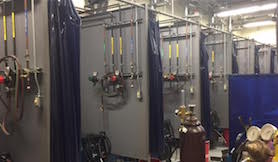How Harper College Rebuilt Its Advanced Manufacturing Program

Today, Harper College is home to one of the most renowned advanced manufacturing programs in the region, but it didn't happen overnight.
Rewind over a decade or so. The U.S. was going through an economic recession, but 600,000 jobs in skilled manufacturing were being left unfilled. During this time, Harper College offered great welding and industrial programs, yet noticed enrollment in other programs like CNC starting to dwindle.
In the fall of 2011, local business leaders, such as Warren Young, former CEO of ACME Industries and Jim Carr, president of CARR Machine & Tool with Dr. Kenneth Ender, president of Harper College. Their mission was to revitalize the advanced manufacturing program at Harper College.
"We asked for more than advice, we asked for buy-in for the program because we couldn't do it alone," said Mary Beth Ottinger, dean of Career and Technical Programs at Harper College.
The goal was to shift the negative perception many young students have towards manufacturing by exposing students to the industry while still in college. To do this, Harper College developed a new apprenticeship program: a hands-on internship where students are given the opportunity to be sponsored by a local manufacturer.
The program comes with several, invaluable benefits. Students have access to Harper College's classroom and lab while being given on-the-job training with a dedicated mentor at the company they work for. This allows for the student to develop the foundational skill set to launch into a career, which leads to guaranteed employment. Partner companies cover the training costs, so students are able to start a career, debt-free. Also, the program is created to provide a healthy balance between coursework and work hours to enhance optimal learning.
For businesses, manufacturers are given the opportunity to train talent "their way." Participating in an apprenticeship program helps manufacturers bridge the skills gap, increase employee loyalty and reduce turnover, and reduce recruiting cost.
You can learn more about this program by visiting harperapprenticeships.org
By the fall of 2012, the curriculum was redefined and designed to specifically align with today's industry demands.
"It wasn't just a response from the community but a partnership with the local businesses that really made all this happen," said Tom Erbach, workforce and economic development business consultant.
Today, Harper College offers programs in four different areas of manufacturing:
- Mechatronics/Automation
Precision Machining
Metal Fabrication
Supply Chain Management
These paths of study provide students with several different opportunities within the manufacturing industry.
"Welding, alone, is a field that offers multiple opportunities for students," said Ottinger. "The college also continues to improve its program by offering new courses for upcoming, growing fields, such as mechatronics."
Dr. Ender also put together a proposal to collaborate with 21 other local community colleges to expand course offerings. If a student is interested in a course that Harper College does not offer, they can take the class at one of their partner colleges and still pay in-district tuition.
Harper College has come a long way in less than a decade, but there's still a lot of work to do. In 10 years, the latest research estimates the number of unfilled manufacturing positions will grow to two million.
To fight harder against the skills gap, Harper College is focusing on strengthening relationships with local high schools to educate students on manufacturing at a younger age.
To learn more about Harper College's advanced manufacturing program, listen to the Strictly Business episode: How Harper College Got Its Groove Back. To learn more about the program, contact Mary Beth Ottinger at 847-925-6374 or mottinge@harpercollege.edu.
